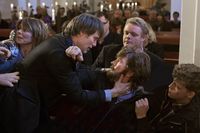MOVIE REVIEW
The Hunt (2012)
If it’s not too unfair to say it, Thomas Vinterberg’s films often convey the uncertainty of an artist casting around for a directorial identity. The enormous critical success of “The Celebration” in 1998 was followed by the flashy sci-fi ambition of “It’s All About Love,” an attempt to distance himself from both the artificial austerity of the Dogme regime and the work of his compatriot Lars von Trier.
Despite the signs that he wanted to escape the shadow of his former collaborator, the next few films followed an inarguably Mr. von Trier-like trajectory, with “Dear Wendy” being a “Dogville”-esque slice of subverted Americana and low-key parochial comedy “When a Man Comes Home” mirroring Mr. von Trier’s simultaneous diversion into chastened backtracking, “The Boss of It All”.
Following the partial return to form of “Submarino,” Mr. Vinterberg is firmly back on track with “The Hunt,” a film that satisfies his interest in hard-hitting taboo issues while retaining flashes of the old Dogme-era mischievousness. It’s a film that’s truly cinematic and refuses to be hidebound to earthy realist roots simply because of its gritty subject matter, while also displaying a structural cohesiveness and maturity often absent from the work of his more famous cohort. Thankfully it’s a balance that Mr. Vinterberg finally seems comfortable with.
In a small Danish town where everybody knows each other, Lucas’s (Mads Mikkelsen) divorcée status and job in a children’s nursery mark him out as a slightly more sensitive, but nevertheless fully accepted, member of the male population’s drinking and hunting circle. Things begin to go badly wrong for him when his friend’s 5-year-old daughter — upset following a moment of awkwardness between them — uses some unfortunately ambiguous language picked up from her older brother to describe her feelings towards him. The girl is subsequently interviewed by teachers and townsmen in a highly suggestible manner and encouraged to expand on nonexistent accusations until any suggestion of misrepresentation evaporates. Before too long Lucas is stripped from his job and has the whole town after his blood before the police have even been called.
Mr. Vinterberg presented a reasonably plausible outline of how hysteria can quickly consume a community that refuses to allow any explanations or alternate versions of events. If the film was made in the 20th century it might have been more concerned with the political parallels of the phenomenon of mass suggestibility, but instead the film is genuinely and sympathetically focused on Lucas’s plight, a nightmarish wrong-man scenario of which Hitchcock might be proud. What the film does warn against is the specific hysteria that surrounds pedophilia, a trait that Western societies have become so desperate to eradicate that only the most vitriolic and implacable reactions quickly become the acceptable norm.
It’s a sensitive issue for a film to probe and the only other similar example I can think of came from the unique mind of British satirist Chris Morris in 2001, when his TV series “Brass Eye” attempted to puncture the bombast of an increasingly dangerous anti-pedophile campaign by British newspapers (which inadvertently resulted in pediatricians being witch-hunted).
In order for the film to be a full-blooded satire in the same vein, Mr. Vinterberg would have to paint his townspeople as hypocritical idiots; but the film is subtler than that. And though there are some moments which suggest the tone of tongue-in-cheek Buñuelian mischief, Mr. Vinterberg got the tone just about right. For the most part the audience is expected to take this tale at face value, with the hysteria expanding as a result of townspeople acting in ways that — while occasionally unwise — are scarily recognizable and rational.
Some viewers may find issue with the fact that a small girl’s dishonesty is the source of the maelstrom, and believe that it’s problematic for a film tackling the subject of pedophilia to be perceived as laying any blame at the feet of children. In this regard Mr. Vinterberg didn’t have the relative luxury of painting his accuser as psychologically flawed, as in similar films about dangerously misconstrued exchanges such as “Atonement” or “Oleanna,” where the characters are old enough to know better. Instead he has to tread carefully in presenting the girl as confused and eager to please, rather than calculating. In my opinion he succeeded — and if it was a risky tactic to make the child character as culpable as the story presents her, it was dramatically beneficial because the run of events leading up to the accusation is so plausible.
What strains credulity a bit more is Lucas’s initial nonchalance and his refusal to vehemently proclaim innocence at any opportunity. Also a bit dodgy — and definitely a touch that Buñuel would have avoided — is the fact that the only friend who believes Lucas is noticeably the most bourgeois of them all, living in a grand detached house markedly more opulent than anyone else's.
Despite these minor issues, the film is still powerful and engaging enough to outweigh these concerns. Mr. Mikkelsen excellent performance has already been justly awarded at Cannes Film Festival, and it’s a perfect piece of casting because he has a face that can be construed as slightly sinister (hence his usual bad-guy roles) while also being striking enough for it to be believable when he’s enthusiastically courted by his Polish girlfriend at the beginning of the film.
It’s also strikingly filmed, Mr. Vinterberg and cinematographer Charlotte Bruus Christensen dreamily heightening reality with their cinematography so that the fabulous church confrontation scene at the end of the film has the air of a feverish internalized psychodrama reaching its apogee, accentuating the film’s focus on the personal consequences of such tragic misunderstandings.

Comments